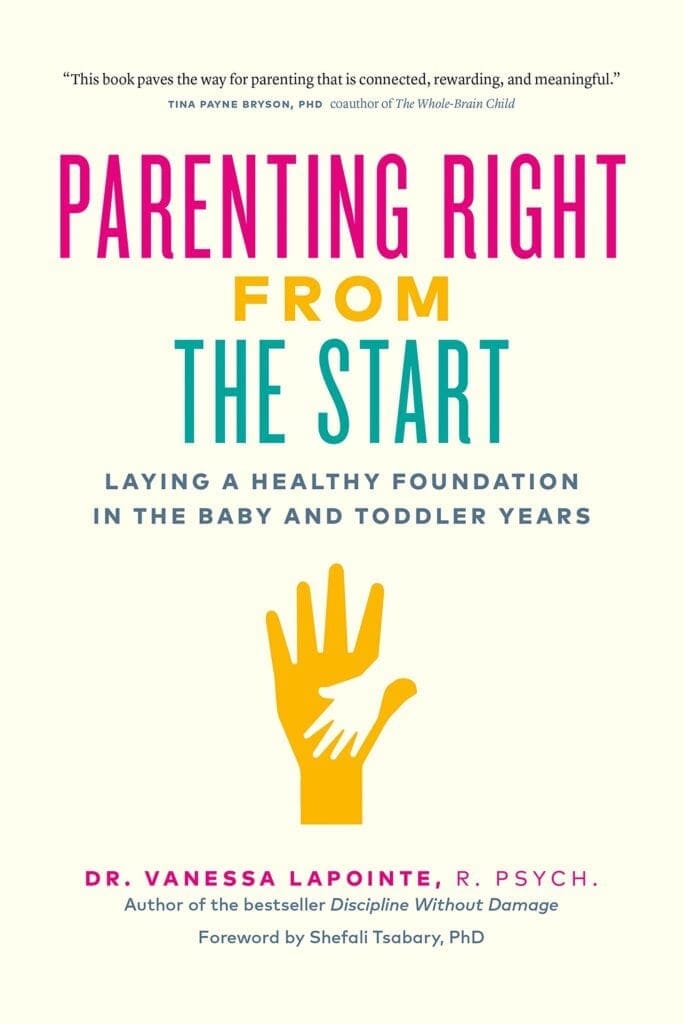Dr. Vanessa Lapointe: Child Development in a Fast-Paced World
Girls That Create is excited to share a guest excerpt from Dr. Vanessa Lapointe’s book Parenting Right From the Start: Laying a Healthy Foundation in the Baby and Toddler Years. Dr. Lapointe is a mom, registered psychologist, parenting educator, best-selling author, international speaker, and a regularly invited media guest. Founder and director of The Wishing Star Lapointe Developmental Clinic, she has been supporting families and children for almost 20 years, and has previous experience in community mental health and the school system.
The Importance of Development Awareness in a Fast-Paced World
How many times have you sat in a restaurant and watched a child under the age of six receive a scolding for not sitting still during a meal? Or heard a three- or four-year-old admonished for not sharing? Or observed an eight-year-old punished for having a meltdown when asked to take out the garbage? Or witnessed a fourteen-year-old get grounded for freaking out when told they couldn’t hang with friends on a Friday evening?
The parental response of punishment and consequence for such actions is not an uncommon occurrence in our world. Yet each one of those examples represents a child with an underdeveloped brain responding exactly as they should according to their stage of development. Many of us fall into the trap of expecting a child to absorb and adopt adult behaviour even though the human brain doesn’t fully mature until sometime in the mid to late twenties.
That six-year-old fidgeting at the dinner table is incapable of sustained focus and attention; the three-year-old simply cannot share; the eight-year-old hasn’t developed the self-control needed to stay calm in the face of a roadblock like “chores” when what he really wants to do is shoot hoops; and the fourteen-year-old is bound to lose control of his feelings in the face of big emotions. So settle down, big people. Your kiddos are being and doing just what they are meant to be and do along their entirely normal developmental journey.
Waiting for Development to Occur
The trouble is that waiting for development to occur can be bothersome for us big people raising children in a fast-paced world. We try to hurry development along rather than championing it at every point along the way. But children are not small adults, and we cannot force them into adulthood. Self-regulation will look different in a baby, a toddler, and a preschooler. Babies bite because they know no other way to settle their bodies down. Toddlers have tantrums because they are trying to figure out how to become their own person, even as they lack the ability to settle themselves in the face of heightened emotion.
Preschoolers shove, push, hit, and don’t wait their turn because those behavioural niceties are still a foreign language when they are taken over by a big desire or need. We must respect that children are growing a brain at the rate of billions of neural connections a day. That level of growth will need to continue for years before they have any natural ability to manage their impulses and make “good choices” with some semblance of consistency.
Once, after I presented a workshop, a father told me how his nine-year-old son had been struggling to manage his big emotions in response to disappointing news or requests by his parents to complete chores. Every time the child lost it, his parents would reprimand him for his “bad behaviour” and use behaviorist-inspired strategies such as consequences, timeouts, and removal of privileges. One day, after yet another of these incidents, the father asked his son in exasperation, “What is wrong with you? Why can’t you do as you are told and stop reacting like this? I’ve told you a million times!” In his gorgeous, infinite wisdom, the son replied to his father, “Dad, what is wrong with you? You’ve told me a million times and I still can’t do it. Why do you keep telling me the same thing over and over when I can’t do it?” Nailed it.
Inspire and Champion Development
You cannot make growth and maturity happen faster by demanding its progression. As David Loyst, a child development specialist who works with children with autism, says, “I’ve never seen a plant grow faster by pulling on the top of it.” Instead of demanding development, a parent’s job is to inspire it and champion it. Now recall that connection and attachment are the foundations for healthy child development.
When a child is asked to adopt behaviours that are not yet a natural part of their developmental repertoire, that child is forced to reject development in the name of acquiescence so that they can maintain the connection and secure approval from their parent. How many times did this scene play out for you as a child, whether in your home or in a classroom?
Many of us have internalized this scenario, this dance of “do it or else you will pay with a loss of approval, acceptance, or connection.” And now we risk recreating it as parents—unless we are willing to bring it to our awareness and work determinedly to sidestep it. We need to understand wholeheartedly how relationship is essential to healthy child development. And we need to simultaneously reject the option of withdrawing attachment and connection from our children in the name of good behaviour or unrealistic developmental expectations. Growth takes time. Development takes time. Building a strong relationship with our children will ensure that this all goes down exactly as nature intended.
Dr. Vanessa Lapointe
Second photo provided by Dr. Lapointe
More Girls That Create Posts
How to Help Your Girl See Her Strengths
A Conversation with Dr. Michele Borba about Thrivers
10 Easy Snacks to Help Your Child’s Imagination
This post contains an affiliate link via Bookshop, whose mission is to financially support local, independent bookstores.




